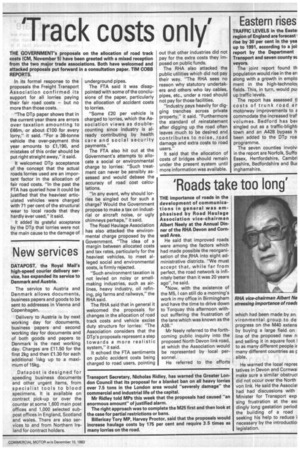'Track costs onl
Page 7

If you've noticed an error in this article please click here to report it so we can fix it.
THE GOVERNMENT's proposals on the allocation of road track costs (CM, November 5) have been greeted with a mixed reception from the two major trade associations. Both have welcomed and attacked proposals put forward in a consultation paper. TIM COBB REPORTS.
In its formal response to the proposals the Freight Transport Association confirmed its support for all lorries paying their fair road costs but no more than those costs.
"The DTp paper shows that in the current year there are errors over taxation amounting to £46m, or about £100 for every lorry," it said. "For a 38-tonne vehicle the over-payment this year amounts to £1,190, and mistakes of this order should be put right straight away," it said.
It welcomed DTp acceptance of the concept that the actual roads lorries used are an important factor in the allocation of fair road costs. "In the past the FTA has queried how it could be justified that the heaviest articulated vehicles were charged with 71 per cent of the structural wear to local raods that they hardly ever used," it said.
It added its grateful acceptance by the DTp that lorries were not the main cause to the damage of underground pipes.
The FTA said it was disappointed with some of the conclusions of the paper, particularly the allocation of accident costs to lorries.
"Some £20 per vehicle is charged to lorries, which the Association views as doublecounting since industry is already contributing by health care and social security payments."
The FTA also hit out at the Government's attempts to allocate a social or environmental charge to lorries: "Such treatment can never be sensibly assessed and would debase the accuracy of road cost calculations.
"In any event, why should lorries be singled out for such a charge? Would the Government propose to make a tax on industrial or aircraft noise, or ugly chimneys perhaps," it said.
The Road Haulage Association has also attacked the environmental charge proposed by the Government. "The idea of a margin between allocated costs and tax rates, particularly for the heaviest vehicles, to meet alleged social and environmental costs, is firmly rejected.
"Such environment taxation is not levied on noisy or smellmaking industries, such as airlines, heavy industry, oil refining, pig farms and railways," the RHA said.
The RHA said that in general it welcomed the proposals for changes in the allocation of road track costs and vehicle excise duty structure for lorries: "The Association considers that the DTp's proposals represent a step towards a more realistic system," it said.
It echoed the FTA sentiments on public accident costs being charged to road users, pointing out that other industries did not pay for the extra costs they imposed on public funds.
The RHA also attacked the public utilities which did not pay their way. "The RHA sees no reason why statutory undertakers and others who lay cables, pipes, etc„ under a road should not pay for those facilities.
"Industry pays heavily for digging trenches across private property," it said. "Furthermore the standard of reinstatement after digging up the road often leaves much to be desired and contributes to noise, road damage and extra costs to road users."
It said that the allocation of costs of bridges should remain under the present system until more information was available.












































































































